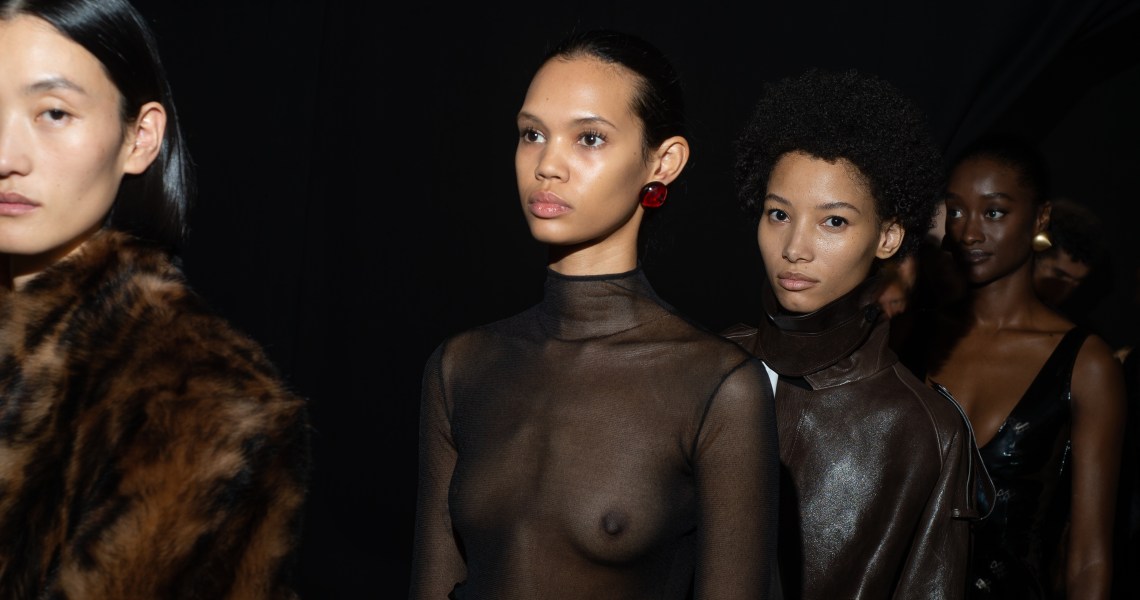BIPOC designers, including Maximilian Davis at Ferragamo, are starting to make waves at Italian heritage houses.
Other BIPOC designers showing in Milan included Serhat Işik and Benjamin A. Huseby at Trussardi, Ibrahim Kamara at Off-White and Rhuigi Villaseñor at Bally. But is it enough to turn the tide on diversity within the Italian fashion industry? Edward Buchanan, co-founder of D&I consultancy We Are Made in Italy, said Italy’s fashion future is hopeful, but still has a long way to go.
Milan Fashion Week appears to have turned the tide on diversity. At Ferragamo, Maximilian Davis steered Ferragamo toward success among audiences young and old with a collection encompassing both sharp tailoring and standout accessories. Davis, 27, has been with the brand since March 2022.
“Product-wise, the return to tailoring and the emergence of the ‘power coat’ — a larger-than-life, floor-length statement piece — has brought excitement and a clear departure from pandemic years,” said Patricia Maeda, director of womenswear at consumer insights agency Fashion Snoops, regarding the big trends that emerged across Milan runways. “Capturing the essence of everyday things was a theme. [It was about] rejecting the superfluous, embracing high quality and caring for the clothes we own, all the while elevating them with stunning precision and interesting design details. And that’s what modern dressing means today.”
However, Milan remains one of the whitest fashion capitals globally, with both fashion week designers and show invitees lacking diverse representatives. Chloe King, fashion market director at Neiman Marcus, highlighted the lack of diversity in her February 26 Instagram Stories. There were no BIPOC-owned brands on this season’s Milan Fashion Week schedule. And the lack of diversity remains a thorny issue in the Italian fashion industry.
In protest, Milan-based Stella Jean, the only Black member of the Italian National Fashion Chamber, the Italian national fashion week organization, announced a hunger strike before the week’s first show, at a Chamber conference on February 8. According to Jean, ahead of the week, the organization cut its ties with and funding of We are Made In Italy, the D&I consultancy helmed by Jean, Buchanan and Michelle Ngonmo, head of Afro Fashion Week. We are Made In Italy was scheduled to open Milan Fashion Week with a digital presentation, she said.
Jean interrupted the organization’s press conference, saying, “The chamber told us, ‘We didn’t know there were Italian designers who weren’t white.’ But we brought them to the runway. And the [Italian National Fashion Chamber] supported us for two years. Then we were abandoned.” WAMI is currently restructuring its organization as it seeks alternative funding.
Ad position: web_incontent_pos1
WAMI first presented POC brands during Milan Fashion Week Spring 2021. They included Gisèle Claudia Ntsama, Fabiola Manirakiza of Frida Kiza, Mokodu Fall, Karim Daoudi and Joy Meribe.
Buchanan, who also founded knitwear brand Sansovino 6, is a 25-year veteran in the Italian fashion industry, having worked as design director at Bottega Veneta in 1995. Talking about Jean’s protest, he said, “Stella and Carlo [Capasa, president of the Italian National Fashion Chamber] had a real conversation about diversity at the February 8 conference, and she made a personal decision. I know how invested Stella is in this project and in the community, and she took a very strong stance.”
He added, “It is our responsibility to protect these kids and this community, because they are the ones that suffer when they don’t have the possibility to show what they’ve been working on for the season.” Buchanan is actively working to increase BIPOC presence in Italy’s creative industries. On February 26, he co-launched the Black Carpet Awards, honoring creatives in the Italian fashion, art, food and entertainment industries.
Recently, more local heritage houses have put BIPOC talent in the creative director position. “Last season and this season, we have more BIPOC designers at the top of houses than ever before,” said Buchanan. “It is unprecedented. It’s not a revolution of everything, but there is definitely a conversation and shift happening in the Italian fashion industry.”
Home-grown BIPOC designers are still non-existent, and there remains just one BIPOC member of the Italian National Fashion Chamber, out of 200.
Ad position: web_incontent_pos2
Buchanan said the focus of WAMI is to support Italian-born BIPOC designers. “Our mentorship at WAMI is aimed at giving them direction in what they want to do as a business: Who are they looking at? Who is the consumer?” he said. “And we want to make sure that they have proper factory connections.” He said the main difference now between the WAMI designers and those working inside big Italian fashion houses is that they have not been presented with the same opportunities. He hopes to bring those opportunities to home-grown talent.
“The next question now is: How can we find the capital to actually support these projects?” he said. “We are now going to approach it through Afro Fashion Week, the Black Carpet Awards and organizations like Meta, which partnered with us for the awards.”




